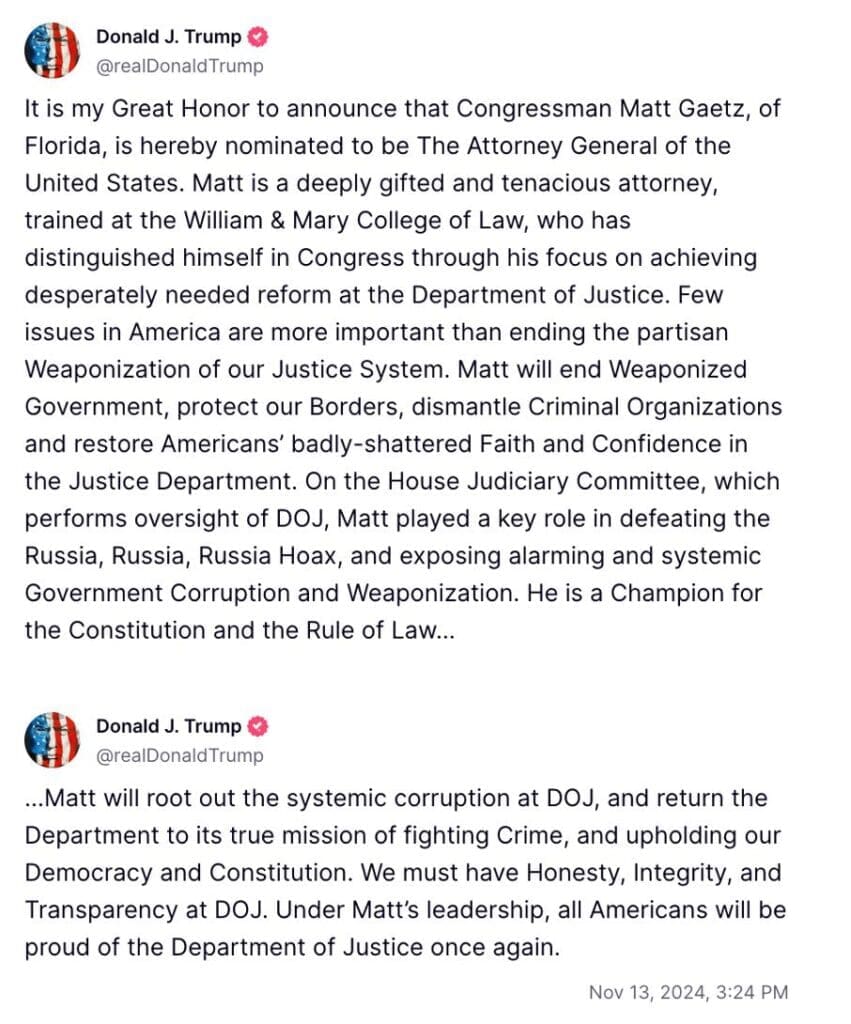Trump nominates Matt Gaetz as U.S. Attorney General, signaling shift to cryptocurrency-friendly Justice Department
On November 13, President-elect Donald Trump nominated Matt Gaetz, a prominent Bitcoin supporter, as Attorney General to lead the U.S. Department of Justice. Attorney General Matt Gaetz’s record of supporting cryptocurrency-friendly legislation makes his nomination important for the digital asset industry, which often faces regulatory scrutiny. The nomination highlights Gaetz’s support for cryptocurrency innovation and could transform the DOJ’s approach to digital assets, financial technology and the regulatory environment.
Gaetz’s appointment could be attractive to the cryptocurrency industry due to his ongoing efforts to integrate Bitcoin into mainstream financial practices. Gaetz previously proposed legislation that would allow the IRS to accept Bitcoin for tax payments, positioning it as a step toward modernizing the U.S. tax system. He also co-sponsored the Financial Innovation and Technology for the 21st Century (FIT21) Act, which promotes blockchain and digital assets as tools for economic growth. Now, as Attorney General, Matt Gaetz will have the opportunity to influence cryptocurrency policy from a different angle, potentially shaping a regulatory framework to better support digital assets and other financial innovations.


Long-time Bitcoin supporter
Conservative firebrand Matt Gaetz has consistently advocated for Bitcoin adoption. In 2023, he proposed legislation that would require the IRS to accept Bitcoin, inspired by a trip to El Salvador, where Bitcoin is legal tender. According to Gaetz, allowing Bitcoin taxes to be paid would modernize the U.S. tax system and encourage digital currency adoption. Gaetz’s stance on Bitcoin could impact the DOJ’s views on cryptocurrencies, especially as the market grows in value and importance. As Matt Gaetz takes over as Attorney General, his Bitcoin advocacy could become central to the DOJ’s future cryptocurrency policy.
Trump’s nomination of Gaetz also comes as the Republican Party takes a more supportive stance on digital innovation. As a Bitcoin supporter, Gaetz fits into this broader GOP strategy to work with digital finance advocates and voters who value cryptocurrency-friendly policies. His support for cryptocurrencies could bring a new perspective to the DOJ, which often scrutinizes digital assets.
Potential Changes in DOJ’s Cryptocurrency Approach
If confirmed, Gaetz would lead DOJ’s regulatory policy at a time when the agency will play a significant role in cryptocurrency enforcement. Under the Biden administration, current DOJ policies have increased oversight of digital assets, leading to high-profile lawsuits. Gaetz’s appointment signals a turning point in how the DOJ handles cryptocurrency regulation, potentially focusing on innovation rather than enforcement. This approach creates a more balanced regulatory environment, allowing blockchain projects and cryptocurrency businesses to grow while maintaining security.
Gaetz’s nomination has garnered attention for his cryptocurrency-focused policies, but he is also focused on broader regulatory reform. He has previously expressed concerns about the “weaponization of government,” which could impact his stance on limiting the DOJ’s influence over cryptocurrency projects. The focus on reducing government intervention is consistent with Trump’s goal of implementing a less restrictive regulatory framework, especially in industries such as digital finance where innovation is outpacing regulation. The nomination of Matt Gaetz to be Attorney General emphasizes these broader regulatory principles.
Gaetz’s background and broad policy goals
In addition to advocating for Bitcoin, Matt Gaetz has also advocated for ethical practices in government finances. Earlier this year, he co-sponsored the Restoring Trust in Government Act, a bipartisan initiative aimed at preventing members of Congress from owning or trading certain financial assets. The bill seeks to reduce conflicts of interest by limiting lawmakers’ ability to trade assets and aligning their financial activities with the public interest. Gaetz’s push for ethical policies could influence his approach at the Justice Department, particularly toward strengthening transparency in emerging financial technologies.
Gaetz’s broad support for innovative financial practices is evident in his co-sponsorship of the FIT21 Act. This bill promotes emerging technologies, including blockchain, as a path to economic development in the United States. His commitment to growing technology within the legal system demonstrates that he can prioritize policies that foster innovation while maintaining accountability. Gaetz’s alignment with Trump’s vision for a modernized DOJ could lead to a reformative, more technical approach to the department’s policy direction.
Placements with industry-wide impact
The nomination of Matt Gaetz could be an opportunity for the digital asset industry to reshape the DOJ’s stance on cryptocurrencies. His leadership could also encourage regulatory adjustments that foster innovation while ensuring accountability. These changes could potentially make it easier for cryptocurrency companies to enter the market, reduce regulatory hurdles, and attract more investment to blockchain projects.
Attorney General Matt Gaetz will play a key role in enforcing laws affecting the cryptocurrency industry. His position will be a focal point for those looking to the U.S. government for a more balanced approach to digital asset regulation. Gaetz’s potential to influence DOJ policy gives the industry hope for a supportive regulatory environment under the incoming Trump administration.

